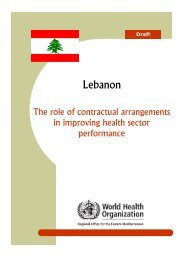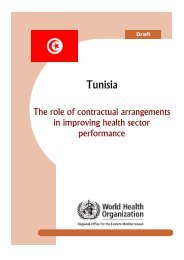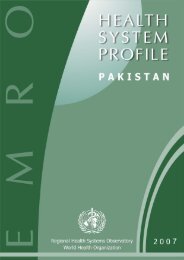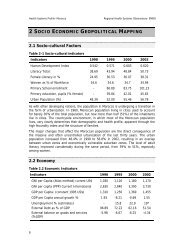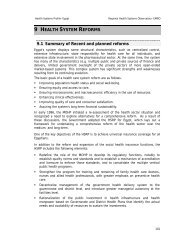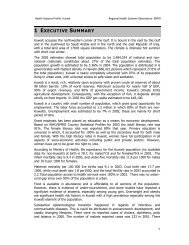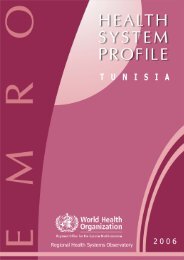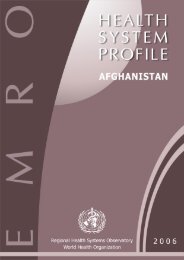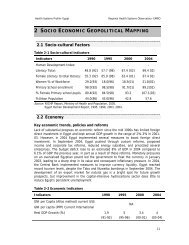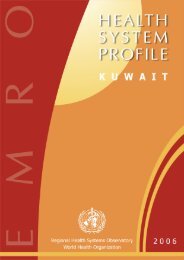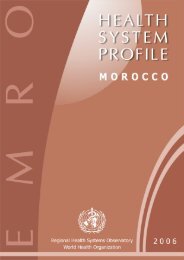The role of contractual arrangements in improving health sector ...
The role of contractual arrangements in improving health sector ...
The role of contractual arrangements in improving health sector ...
You also want an ePaper? Increase the reach of your titles
YUMPU automatically turns print PDFs into web optimized ePapers that Google loves.
Pakistan<br />
Each contract generally spells out the agreed mechanisms for resolv<strong>in</strong>g any disputes, if<br />
they arise, between the partners. However, the description <strong>of</strong> the proposed <strong>arrangements</strong> is not<br />
always sufficiently comprehensive to cover all dimensions <strong>of</strong> potential dispute between the<br />
partners. <strong>The</strong>re is a need for strengthen<strong>in</strong>g the capacity <strong>of</strong> managers to make effective use <strong>of</strong><br />
the current legal framework for smooth operations under the <strong>contractual</strong> environment.<br />
Capacity: strengths and weaknesses<br />
Purchaser<br />
Many national programmes (such as the AIDS control programme, tuberculosis control<br />
programme, malaria control programme, lady <strong>health</strong> workers programme), through<br />
experience, have developed <strong>arrangements</strong> for prepar<strong>in</strong>g bid details, <strong>in</strong>vit<strong>in</strong>g bids through open<br />
as well as selective bidd<strong>in</strong>g process, evaluat<strong>in</strong>g the technical and f<strong>in</strong>ancial proposals,<br />
negotiat<strong>in</strong>g the terms, prepar<strong>in</strong>g the documents and award<strong>in</strong>g the contracts.<br />
<strong>The</strong> complexity <strong>of</strong> government f<strong>in</strong>ancial procedures sometimes delay the release <strong>of</strong><br />
funds accord<strong>in</strong>g to the agreed schedules. <strong>The</strong> fiduciary management <strong>arrangements</strong> do vary<br />
across contracts. This implies programme ability to manage the diversity <strong>of</strong> f<strong>in</strong>ancial flow<br />
mechanisms across projects. An example is the AIDS control programme effectively work<strong>in</strong>g<br />
with multiple sets <strong>of</strong> f<strong>in</strong>ancial flow mechanisms, accord<strong>in</strong>g to the source <strong>of</strong> funds, e.g.<br />
government, World Bank or GFATM.<br />
Some <strong>of</strong> the programmes have started strengthen<strong>in</strong>g their staff capacity and<br />
<strong>arrangements</strong> to supervise and monitor the implementation <strong>of</strong> contracted out projects,<br />
<strong>in</strong>clud<strong>in</strong>g the f<strong>in</strong>ancial performance <strong>of</strong> projects. <strong>The</strong> programmes have also developed<br />
<strong>arrangements</strong> for design<strong>in</strong>g and conduct<strong>in</strong>g third-party evaluation and evaluation through a<br />
team <strong>of</strong> experts from with<strong>in</strong> and outside the programme.<br />
Many <strong>of</strong> the programmes, especially at prov<strong>in</strong>cial level and below, are currently<br />
work<strong>in</strong>g with a sub-optimal mix <strong>of</strong> technical and adm<strong>in</strong>istrative expertise for manag<strong>in</strong>g the<br />
contract<strong>in</strong>g process, monitor<strong>in</strong>g and evaluat<strong>in</strong>g the performance, and manag<strong>in</strong>g f<strong>in</strong>ances <strong>in</strong> a<br />
<strong>contractual</strong> environment. <strong>The</strong> limited capacity is related ma<strong>in</strong>ly to <strong>in</strong>-adequate number and<br />
skills <strong>of</strong> the programme staff, but also <strong>in</strong>cludes sub-optimal resources and operational<br />
systems. However, these capacities do vary widely across the programmes. At present the<br />
organizational development plans seem <strong>in</strong>adequate to address the capacity challenges by<br />
mak<strong>in</strong>g optimal use <strong>of</strong> potential opportunities.<br />
Provider<br />
<strong>The</strong>re is wide variation <strong>in</strong> the technical, managerial and f<strong>in</strong>ancial capacity <strong>of</strong> private<br />
<strong>sector</strong> providers. Technical capacity refers to the ability to analyse situation, develop<br />
strategies and <strong>in</strong>terventions, plan and implement activities etc. Managerial capacity refers to<br />
the ability to write proposals, negotiate contracts, manage resources <strong>in</strong>clud<strong>in</strong>g staff and<br />
materials, and prepare bus<strong>in</strong>ess plans and reports. F<strong>in</strong>ancial capacity refers to: f<strong>in</strong>ancial<br />
position <strong>in</strong>clud<strong>in</strong>g assets and <strong>in</strong>comes, f<strong>in</strong>ancial systems <strong>in</strong>clud<strong>in</strong>g account<strong>in</strong>g and audit<strong>in</strong>g,<br />
211



